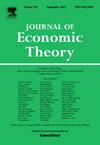前瞻性种群动态的平均场近似
IF 1.2
3区 经济学
Q3 ECONOMICS
引用次数: 0
摘要
研究了连续种群对策的均衡动力学近似于有限种群对策的均衡动力学。新个体随机到来取代原有个体,并做出不可逆的行动选择,以最大化预期贴现终身收益。关键的假设是,他们只观察到关于总体行动分布的不完美信号。我们首先证明了有限种群博弈中行动分布的随机过程是由种群规模变大时的平均场动力学近似的,其中近似精度在所有均衡中是均匀的。在此基础上,建立了大种群极限下均衡的连续性。特别是,每个主体几乎可以忽略不计,因为在均衡中,每个主体的行为几乎是最优的,而不是(错误的)连续总体情况下假定它对其他主体的行为没有影响。最后,对于二元动作超模博弈,我们证明了当智能体有耐心时,当观察噪声变小而群体规模变大时,存在一个唯一的平衡。在此均衡中,每个个体都选择一个风险优势行为,种群全局收敛到相应的稳态。本文章由计算机程序翻译,如有差异,请以英文原文为准。
Mean-field approximation of forward-looking population dynamics
We study how the equilibrium dynamics of a continuum-population game approximate those of large finite-population games. New agents stochastically arrive to replace exiting ones and make irreversible action choices to maximize the expected discounted lifetime payoffs. The key assumption is that they only observe imperfect signals about the action distribution in the population. We first show that the stochastic process of the action distribution in the finite-population game is approximated by its mean-field dynamics as the population size becomes large, where the approximation precision is uniform across all equilibria. Based on this result, we then establish continuity properties of the equilibria at the large population limit. In particular, each agent becomes almost negligible, in the sense that in equilibrium, each agent's action is almost optimal against the (incorrect) belief that it has no impact on others' actions as presumed in the continuum-population case. Finally, for binary-action supermodular games, we show that when agents are patient, there is a unique equilibrium as observation noise becomes small while the population size becomes large. In this equilibrium, every agent chooses a risk-dominant action, and the population globally converges to the corresponding steady state.
求助全文
通过发布文献求助,成功后即可免费获取论文全文。
去求助
来源期刊

Journal of Economic Theory
ECONOMICS-
CiteScore
2.50
自引率
12.50%
发文量
135
期刊介绍:
The Journal of Economic Theory publishes original research on economic theory and emphasizes the theoretical analysis of economic models, including the study of related mathematical techniques. JET is the leading journal in economic theory. It is also one of nine core journals in all of economics. Among these journals, the Journal of Economic Theory ranks fourth in impact-adjusted citations.
 求助内容:
求助内容: 应助结果提醒方式:
应助结果提醒方式:


